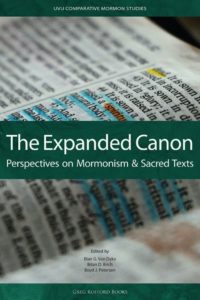 Editors: Blair G. Van Dyke, Brian D. Birch, and Boyd J. Petersen
Editors: Blair G. Van Dyke, Brian D. Birch, and Boyd J. Petersen
Title: The Expanded Canon: Perspectives on Mormonism and Sacred Texts
Greg Kofford Books, 2018. Essays on scripture
Reviewed by Conor Hilton, Dec. 18, 2018
I’ve been picking away at this book for months, but finally finished. It is a fascinating collection of essays about scripture and Mormonism that contain a number of provocative and thoughtful ideas that are worthy of more of my time. The collection felt a bit uneven–not in the quality, but like many essay collections, I wish there had been more conversation between the ideas that were put forward by the authors. As is, it often feels like the seeds of more work to come and I am hungry for the fruits of these seeds. That said, the ideas that are planted here are fascinating and well worth engaging with.
I found the following essays particularly worthy of attention:
David Holland’s piece about the triangle of authority in Mormonism (scripture, prophets, and the Holy Ghost/personal revelation) should be required reading for conversations about authority and struck me as advancing a compelling case for his position, while exploring the seeming contradictions to it.
James Faulconer’s entry on reading scripture literally, which is provocatively titled and makes a convincing case for treating scripture more seriously as a community (by which he means more literally, or literarily). Faulconer’s work appealed to my literature background and stresses aspects of scripture that I think we often neglect as a community.
Claudia Bushman’s essay about the need for creating a canon of women’s scriptural voices is powerful and a call to action that we should heed.
Ann Taves’ entry is the most intriguing of all of the pieces gathered here (likely the most controversial as well). She seeks to find a middle-ground in the history surrounding the physical reality of gold plates and presents a fascinating argument that demonstrates a compelling use of close reading (and admittedly, some speculation).
David Bokovoy’s piece on the Book of Moses as prophetic midrash is fascinating and well-worth engaging with.
The other essays are also intriguing and touch on the Family Proclamation, patriarchal blessings, post-canonical scripture, electronic scripture and more. While I want more from many of the contributors, this book is well worth your time.
